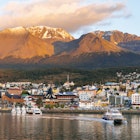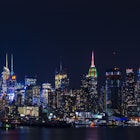
Plan your next epic adventure to one of Iceland's three national parks
Aug 31, 2021 • 6 min read

Be awed by the varied landscapes of Iceland, like this spectacular smoking geothermal field © Martin M303 / Shutterstock
The term “epic” is thrown around a lot, but for Iceland it works. From its numerous glaciers and active volcanoes to its warm and inviting lagoons, this Nordic island has caught the attention of adventure seekers around the globe.
And some of Iceland’s most epic spots are found in the country's spectacular national parks. Each of the country's three national parks has its own characteristic charm – from glacier-tipped mountains and lava-strewn landscapes to the site of the world's very first parliament. “Epic” is exactly the right word.

Snæfellsjökull National Park
Best for wildlife-spotting and otherworldly landscapes
Home to wide lavascapes of ancient magma, vertiginous sea cliffs with colonies of squawking birds, glacier-topped mountains and hiking trails along black-sand beaches, Snæfellsjökull National Park captures nearly the full spectrum of Icelandic landscapes. Named after its resident glacier and volcano, the Snæfellsjökull National Park is on the Snæfellsnes Peninsula on the western coast of Iceland.
Sitting dormant underneath an icecap, the stratovolcano is more than 700,000 years old. The inspiration for Jules Verne’s 1864 novel Journey to the Center of the Earth, the volcano serves as the location where the novel’s heroes found the entrance to their subterranean exploration. Experienced hikers who take the challenge of reaching the peak at 4744ft will be rewarded with impressive views of the surrounding land and sea (though sadly no entrances to the center of the Earth).
While exploring the park, be sure to check out the Vatnshellir Caves. These 8000-year-old lava tubes can only be explored with a guide and offer a unique opportunity to discover more about Iceland’s precious geology underground. Tours are only available in the summer.
Exploring any of the paths along the coast will reveal jutting rocky coves, fields of lava rock covered in moss, numerous seabirds, towering cliffs and a glacier volcano. All of these contribute to the incomparable beauty of Snæfellsjökull National Park.
How do I visit Snæfellsjökull National Park?
You can easily reach the park via car for a day trip from Reykjavik, though spending more time in the area is highly recommended.
It’s free to enter the park but camping and staying overnight is not permitted. If you want to camp, there are nearby campgrounds on other parts of the Snæfellsnes Peninsula.
Find out more about visiting Snæfellsjökull National Park.

Þingvellir National Park (Thingvellir National Park)
Best for historic significance and dramatic formations
It’s somehow appropriate that the site chosen as the world’s first parliament would also be the place where two tectonic plates meet. The settlement of Iceland began in the 9th century, and as the population of the island began to grow, tribal leaders needed a place to meet, hash out disagreements and establish laws. Þingvellir was chosen not for its tectonic importance but for its central location. Thus, the world’s first parliament, Althingi (pronounced ál-thingk-ee) was born.
The site also sits atop of the Mid-Atlantic Ridge, an area where the North American and Eurasian tectonic plates are separating at a rate of 0.8 inches (2cm) a year. If Iceland did not have continuous volcanic activity under the surface of the country providing it with new lava, it would eventually rip apart.
Iceland’s first parliamentarians might not have known of Thingvellir’s geological significance, but they had a taste for real estate: the area is marked by rocky cliffs, a cascading waterfall, and scenic hiking trails steeped in the area’s history.
Visitors to the park most often find themselves walking in the Almannagjá, the narrow valley marking the boundary of the Mid-Atlantic Rift. Follow along the trail surrounded by majestic rocky cliffs and dewy grass, as you enchant yourself with this iconic Games of Thrones location.
As for activities at this Iceland national park, snorkeling and diving in the crystal-clear Silfra fissure are a must for any curious adventurer. For those who prefer to stay above ground, hiking is no short of spectacular just about anywhere in this park.
Whether it's blanketed in snow or lit by the midnight sun, Þingvellir is a park with year-round beauty.
How do I visit Þingvellir National Park?
Found in the southern region of Iceland, this park is one of the three main stops along the iconic Golden Circle route.
There are two ways to get to the Þingvellir National Park. You can arrive by car or take a guided tour. Unfortunately, there is no public transport available.
Luckily, the park is near the lively capital of Reykjavik. It takes about 45 minutes to reach the entrance of the park from the city.
Þingvellir National Park is free to enter but you must pay 750 ISK (~6 USD) per day for parking.
Camping is available at a couple of locations at the park, but you must get a camping permit from the Information Centre upon arrival. Find out more information about camping at Þingvellir National Park.

Vatnajökull National Park
Best for glacial formations and hiking
Covering over 5460 sq miles (that’s 14% of the country), Vatnajökull National Park is Europe’s second largest national park. All that landmass means there’s a lot to explore – from volcanoes (a whopping 10 are inside the park), canyons carved by glacial floods and thundering waterfalls.
The park’s unbeatable landscapes and proximity to wildlife are worth the four-hour car drive (at least) from Reykjavik. An overnight stay will give you some time to pack in as much glorious nature and adventures as possible.
If there’s one natural attraction that you can’t miss when visiting Vatnajökull National Park, it’s Jökulsárlón Glacier Lagoon. The ice calving from the nearby outlet glacier Breiðamerkurjökull creates stunning icebergs that float in the lagoon. Some of the icebergs that slowly drift through the lagoon and out to sea, wash up on the shore across the road. As you walk along the stark black sand, you’ll witness the glistening iceberg fragments scattered across the aptly named Diamond Beach.
The lagoon and beach are favorites among many visitors to Iceland, and a visit to these parts of the park will quickly showcase why. Explore the majestic ice caves, walk on a glacier, hike scenic trails and be spellbound by striking panoramas unlike anywhere else in the world when you visit Vatnajökull National Park.
How do I visit Vatnajökull National Park?
The park is best reached by car as it's on the other side of the country from Reykjavík. Make a road trip along Ring Road and be baffled by all the scenic viewpoints along the way.
Vatnajökull is free to enter, but there is a parking fee of 600 ISK (~5 USD) per day.
Campgrounds at the park are open year-round, but visitors should register themselves before camping and pay the following morning. See here for details on camping at Vatnajökull National Park.
You might also like:
15 best places to visit in Iceland
Transportation in Iceland
This incredible oceanfront geothermal lagoon has opened in Iceland
Explore related stories


 Wildlife & NatureDay trips from New Orleans: 9 can't-miss jaunts from The Big Easy
Wildlife & NatureDay trips from New Orleans: 9 can't-miss jaunts from The Big EasyNov 21, 2024 • 6 min read
 Wildlife & NatureHidden treasures: Where locals love to travel in Argentina
Wildlife & NatureHidden treasures: Where locals love to travel in ArgentinaNov 21, 2024 • 5 min read

 Destination Practicalities21 local tips to know before traveling to England
Destination Practicalities21 local tips to know before traveling to EnglandNov 21, 2024 • 9 min read




